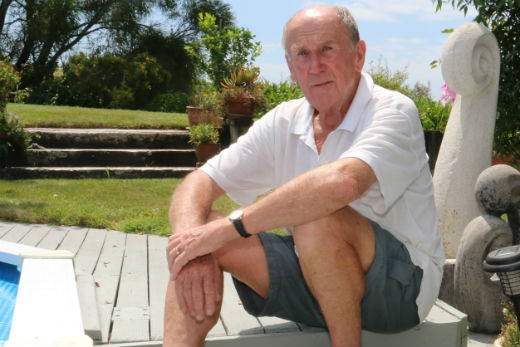The income inequality lobby group Closing The Gap has surveyed local body candidates on what it believes are crucial issues affecting the Bay of Plenty and New Zealand.
And it wants to share the results so the electorate can make considered, informed decisions when they vote for new mayors, councillors and boards in the local body elections.
Income equality advocate Peter Malcolm. Photo: Supplied.
It polled candidates across the region on their attitudes to the ‘living wage', controls on top salaries, provision of social and affordable housing and fair and equitable rating structures.
They asked candidates questions like whether they supported 'the living wage” for local government employees, whether Local Government Organisations – known as LGOs – should be in the business of caring about the welfare of their residents, and whether they should offer discounted public transport for those on low incomes.
'Often voters know very little about candidates apart from self-written profiles,” says income equality advocate Peter Malcolm. 'And attendance at ‘meet the candidate' opportunities has historically been pathetic.”
Peter says for democracies to function properly it's important for eligible people to vote. 'But often the turnout has been considerably less than 50 per cent and often as low as 30 per cent.” And Peter says this means elected representatives cannot be said to represent the constituency.
However, Closing the Gap is delighted with the candidates' response to its survey. 'Traditionally, the level of response is not high but across the four local authorities we canvassed the response was close to 50 per cent.”
Some of those who did not complete the survey explained they were worried about ‘misrepresentation' and they believed the survey was simplistic.
'But if you look at the survey questions below, the responses on our website and the comments, you can decide for yourself the validity of their reasons for no response,” says Peter.
And from those who did respond, it's clear many of the candidates believe inequality, social justice and affordable housing should be the business of our local authorities.
To assist the electorate on deciding who they want to represent it, Closing the Gap released the questions it presented to candidates. 'I suggest voters give the issues their own rating from one (strongly agree) to five (strongly disagree) and compare the outcomes to those of the candidates on our website. That should assist wise decision making and ensure they get the right people to represent them.”
|
QUESTIONS: |
ANSWER |
|
Local Government organisations (LGOs) should take the lead and set an example in caring about the welfare of their residents. |
|
|
LGOs should pay at least the 'living wage” to all their permanent employees. |
|
|
LGOs should be required to publish wage and salary bands in maximum $10,000 steps, starting at the lowest waged employee and including all employees up to and including the CEO. |
|
|
LGOs should have a responsibility to monitor the availability of affordable housing and maintain an adequate supply of low cost housing. |
|
|
LGOs should provide discounted public transport for those people on low incomes (community service card providers). |
|
|
LGOs should provide discounted fees for the use of council services (swimming pools, libraries etc) for people on low incomes (Community Service Card holders). |
|
|
Tauranga should become an accredited 'Child Friendly City”. |
|
|
LGOs should take advantage of the Hon Nick Smith's amendment to the Local Government Act allowing them to adopt policies in relation to (a) employee staffing levels and (b) the remuneration of employees. |
|
|
LGOs should undertake a comprehensive rates review on the same schedule as the Long Term Plan review. |
|
|
Government at national level should change the way the minimum wage is determined and adopt a 'living wage” calculation. |
|
|
|
|
|
1 = Strongly agree / 2 = Agree / 3 = Open to persuasion / 4 = Disagree / 5 = Strongly disagree |
|
The full results of the candidate survey and comments are on the Closing the Gap website: www.closingthegap.org.nz



4 comments
Central Government
Posted on 19-09-2016 09:24 | By Crash test dummies
Most listed are not a Council cost, concern or time waster?
Hmmmm
Posted on 19-09-2016 09:56 | By How about this view!
"The road to hell is paved with good intentions" is the first thing to spring to mind.... "We know best" is the second. Democracy NOT Autocracy should be what we are inquiring about. Once the NEW lot have their bums on seats, who's tune will they march to...? The ratepayers or the business community and city development companies?
D Turnbull
Posted on 19-09-2016 12:34 | By Skidmarks
How about basing all Council salary scales on variable multiples of the living wage, either hourly or full-time equivalent salary? So, a managerial position might be assessed at (1.5, 1.8, 2, 3 ?)times the living wage,for example, and the CEO's salary at (insert assessment here)times the living wage. Such assessments could be made by their employers - us, the ratepayers - at election time. After all, civil servants are supposed to work for the public aren't they? Nah! it'll never happen, but I thought I'd just throw out the suggestion anyway.
Puzzled
Posted on 19-09-2016 16:50 | By Jitter
Most of these questions do not cover the major problems and requirements facing Tauranga city.In fact they appear quite pointless, unneccessary and irrelevant.
Leave a Comment
You must be logged in to make a comment.